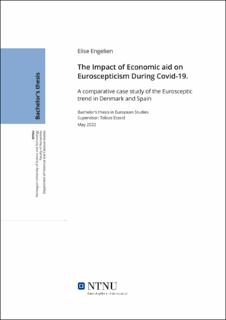The Impact of Economic aid on Euroscepticism During Covid-19.
Bachelor thesis
Permanent lenke
https://hdl.handle.net/11250/3002954Utgivelsesdato
2022Metadata
Vis full innførselSamlinger
Sammendrag
Ettersom utbruddet av Covid-19 pandemien ble i økende grad mer alvorlig, økte også bekymringene for konsekvensene som kunne ramme verdenssamfunnet. Spesielt innenfor helsesektoren og økonomien var bekymringene store, noe som første til innføringen av den økonomiske bistanden ‘Next Generation EU’ (NGEU), for å kunne hjelpe Europeiske land i trengsel. EU er allikevel en stor og mangfoldig union, noe som tidligere har ført til at enkelte land ikke er like mye for en utvikling av den økonomiske integrasjonen. Samtidig har EU sett en økning i tallene for euroskeptisisme i de siste årene, noe som leder til spørsmålet om denne økonomiske utviklingen kan øke tallene for euroskeptisisme etter utbruddet av pandemien.
Av den grunn vil denne avhandlingen utforske om introduksjonen av NGEU økte tallene for euroskeptisisme ved å se på landene Danmark og Spania. De to landene representerer forskjellige deler av unionen, ved å ha store forskjeller på flere forskjellige politiske og sosiale arenaer. Ved å analysere tall hentet fra Eurobarometer og nasjonale undersøkelser, vil oppgaven konkludere med at begge landene har en synkende trend for euroskeptisisme etter utbruddet av pandemien, noe som kan oppfattes som overraskende ettersom tidligere antagelser om euroskeptisisme i Danmark og Spania tilsier noe annet. As the outbreak of the Covid-19 pandemic turned increasingly more severe, so did the concerns of the consequences this might cause on the world society. Especially, the health sector and the economy were areas of concern, leading to the creation of the ‘Next Generation EU’ (NGEU) economic aid, to help European countries in need. However, as EU is a vast and diverse union, further economic integration has not always been a popular way to develop the cooperation. As the levels of Euroscepticism has also increased some in the past years, the question of whether this economic integration might increase levels of Euroscepticism after the outbreak of the pandemic.
For that reason, this thesis will explore whether the introduction of the NGEU increased levels of Euroscepticism, by looking at the representative countries Denmark and Spain. The two represent different parts of the union, by being very different in character on several political and societal areas. By analyzing numbers retrieved from the Eurobarometer and national surveys, the thesis will conclude that both countries have a decreasing trend in Euroscepticism after the outbreak of the pandemic, which can be perceived as surprising based on previous perceptions of how Euroscepticism is represented in Denmark and Spain.
